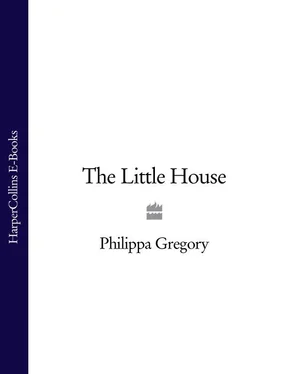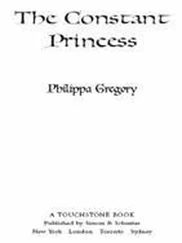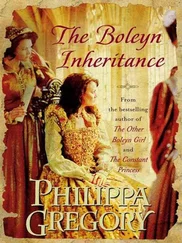The Little House
Philippa Gregory
Cover Page
Title Page The Little House Philippa Gregory
One
Two
Three
Four
Five
Six
Seven
Eight
Nine
Ten
Eleven
Twelve
Thirteen
Fourteen
Fifteen
Sixteen
Seventeen
Eighteen
Nineteen
Twenty
About the Author
By the same author
Copyright
About the Publisher
ON SUNDAY MORNING, on almost every Sunday morning, Ruth and Patrick Cleary drove from their smart Bristol flat to Patrick’s parents’ farmhouse outside Bath. They had only been married for four years and Ruth would have preferred to linger in bed, but this Sunday, as almost every Sunday, they had been invited for lunch at one o’clock prompt.
Patrick always enjoyed returning to his home. It had once been a dairy farm, but Patrick’s father had sold off the land, retaining only a little wood and circle of fields around the house: an eighteenth-century manor farm of yellow Bath stone. While never being so vulgar as to lie, the Clearys liked to suggest that their family had lived there forever. Patrick’s father liked to imply that he came from Somerset yeoman stock and the farm was their ancestral home.
Patrick’s mother opened the door as they came up the path. She was always there when they arrived, ready to fling open the door in welcome. Once Ruth had teased Patrick, saying that his mother spent her life peeping through the brass letterbox, so that she could throw open the door as her son arrived, wrap him in her arms, and say, ‘Welcome home, darling.’ Patrick had looked offended, and had not laughed.
‘Welcome home, darling,’ his mother said.
Patrick kissed her, and then she turned and kissed Ruth’s cheek. ‘Hello, dearest, how pale you look. Have you been working too hard?’
Ruth was surprised to find that immediately she felt exhausted. ‘No,’ she said.
‘Freddie, they’re here!’ Ruth’s mother called into the house, and Patrick’s father appeared in the hall.
‘Hello, old boy,’ he said lovingly to Patrick. He dropped an arm briefly on Patrick’s shoulder and then turned to Ruth and kissed her. ‘Looking lovely, my dear. Patrick – saw you on television last night, the piece on the commuters. Jolly good. They used a bit of it on News at Ten. Good show.’
Patrick grimaced. ‘It didn’t come out how I wanted,’ he said. ‘I had a new film crew and they all had their own ideas. I might be the reporter, but none of them want to listen to me.’
‘Too many chiefs and not enough Indians,’ Frederick pronounced.
Ruth looked at him. He often said a sentence, like a little motto, that she had never heard before and that made no sense to her whatsoever. They were a playful family, sometimes quoting family jokes or phrases of Patrick’s babytalk that had survived for years. No one ever explained the jokes to Ruth; she was supposed to laugh at them and enjoy them, as if they were self-explanatory.
‘That’s shoptalk,’ Patrick’s mother said firmly. ‘Not now. I want my assistant in the kitchen!’
It was one of the Sunday rituals that Patrick helped his mother in the kitchen while Ruth and Frederick chatted in the drawing room. Ruth had tried to join the two in the kitchen once or twice and had glimpsed Patrick’s indispensable help. He was perched on one of the kitchen stools, listening to Elizabeth and picking nuts from a bowl of nibbles she had placed before him. When Ruth had interrupted them, they had looked up like two unfriendly children and fallen silent. It was Elizabeth’s private time with her son; she did not want Ruth there. Ruth was sent back into the sitting room with the decanter of sherry and instructions to keep Frederick entertained. She learned that she must wait for Patrick to put his head around the door and say, ‘Luncheon is served, ladies and gents.’ Then Frederick could stop making awkward conversation with her and say, ‘I could eat a horse! Is it horse again?’
Elizabeth served roast pork with crackling, apple sauce, roast potatoes, boiled potatoes, peas and carrots. Ruth wanted only a little. In Bristol in the canteen of the radio station where she worked as a journalist, she was always hungry. But there was something about the dining room at the farmhouse that made her throat close up. Patrick’s father poured red wine and Ruth would drink two or three glasses, but she could not make herself eat.
Patrick ate a good lunch, his plate favoured with the crunchiest potatoes and the best cuts of meat, and always had seconds.
‘You’ll get fat,’ his father warned him. ‘Look at me, never gained a pound till I retired from the army and had your mother’s home cooking every day.’
‘He burns it all up,’ Elizabeth defended her son. ‘His job is all nerves. He burns it all up with nervous energy.’
They both looked at Ruth, and she managed a small uncomfortable smile. She did not know whether to agree that he would get fat, which would imply an unwifely lack of admiration, or agree that he lived on his nerves, which would indicate that she was not protecting him from stress.
‘It’s been a devil of a week,’ Patrick agreed. ‘But I think I may be getting somewhere at last.’
There was a little murmur of interest. Ruth looked surprised. She did not know that Patrick had any news from work. She wondered guiltily if her own work, which was demanding and absorbing, had made her neglect his ambition. ‘I didn’t know,’ she said.
He smiled his wide, handsome smile at her. ‘I thought I’d wait to tell you until it was shaping up,’ he said.
‘No point in counting chickens,’ his father agreed. ‘Spill the beans, old boy.’
‘There’s talk of a new unit, to do specialist local film documentaries,’ Patrick said. ‘It’ll be headed by a news producer. The best news producer we’ve got.’ He paused, and smiled his professionally modest smile. ‘Looks like I’m in line for the job.’
‘Good show.’
‘Wonderful,’ Patrick’s mother said.
‘What would you do?’ Ruth asked.
‘Regular hours!’ Patrick replied with a little chuckle. ‘That’s the main thing! I’d still do reports to camera but I wouldn’t be on call all the time, and I’d not be running around out of hours. I’d have more control. It’s an opportunity for me.’
‘Is this a bubble-size celebration?’ Patrick’s father demanded of Ruth.
She looked at him blankly. She simply had no idea what he meant.
‘Champagne, darling,’ Patrick prompted. ‘Do wake up!’
‘I suppose it must be.’ Ruth stretched her mouth in a smile, trying to be bright and excited. ‘How wonderful!’
Patrick’s father was already on his way to the kitchen. Elizabeth fetched the special champagne glasses from the sideboard.
‘He’s got a bottle already chilled,’ she said to Patrick. Ruth understood that this was significant.
‘Oh ho!’ Patrick said as his father came back into the room. ‘Chilled already?’
His father gave him a roguish wink and expertly opened the bottle. The champagne splashed into the glasses. Ruth said, ‘Only a little please,’ but no one heard her. She raised her full glass in a toast to Patrick’s success. It was a very dry wine. Ruth knew that dry champagne was the right taste; only inexperienced, ill-educated people liked sweet champagne. If she continued to make herself drink it, then one day she too would like dry champagne and then she would have an educated palate. It was a question of endurance. Ruth took another sip.
‘Now I wonder why you were keeping a bottle of champagne on ice?’ Patrick prompted his father.
Читать дальше












